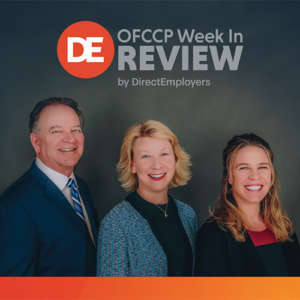
- Comments Open for Disability Inclusion Award
- DE Launched DE Academy
- Paid Sick Leave for Federal Contractors
- Comment on Veteran Employment
- NLRB Rulemaking Agenda Announced
- Spring Regulatory Agenda Released
- OFCCP Declined to Appeal Its Loss in The Analogic Pay Discrimination Case
- EEOC Component 2 Updates!
Monday, May 20, 2019: Comments Open for Disability Inclusion Award
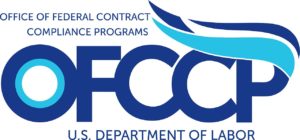
- Evaluate whether the proposed collection of information is necessary for the proper performance of the functions of the agency, including whether the information will have practical utility;
- Evaluate the accuracy of the agency’s estimate of the burden of the proposed collection of information, including the validity of the methodology and assumptions used;
- Enhance the quality, utility, and clarity of the information to be collected; and
- Minimize the burden of the collection of information on those who are to respond, including through the use of appropriate automated, electronic, mechanical, or other technological collection techniques or other forms of information technology, g.,permitting electronic submission of responses.
Comments are due on or before June 19, 2019.
Wednesday, May 22, 2019: DE Launched DE Academy

- Candee J. Chambers, former HR practitioner, and DirectEmployers Executive Director
- John C. Fox, an employment law expert at Fox, Wang, Morgan, P.C.
- Sheridan Walker, disability consultant at HirePotenial
- Matt Brogdon, veteran hiring consultant at Pathfinder Consulting
- Wendy Strobel Gower & Kathleen Lee, disability experts at eCornell
- Denise McGonigal, HR consultant at Purple Ink
DE Members, do you know all there is to know about DE and membership? Obtain your DE Membership certification to prove it! Login now to the new DE Academy via our Connect Community to take your first course!
Wednesday, May 22, 2019: Paid Sick Leave for Federal Contractors
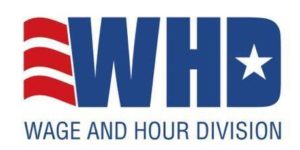
- Evaluate whether the proposed collection of information is necessary for the proper performance of the functions of the agency, including whether the information will have practical utility;
- Evaluate the accuracy of the agency’s estimate of the burden of the proposed collection of information, including the validity of the methodology and assumptions used;
- Enhance the quality, utility, and clarity of the information to be collected; and
- Minimize the burden of the collection of information on those who are to respond, including through the use of appropriate automated, electronic, mechanical, or other technological collection techniques or other forms of information technology, g.,permitting electronic submissions of responses.
Background
On September 7, 2015, President Barack Obama signed Executive Order 13706. This Executive Order (“EO”) established paid sick leave for employees of Federal Contractors. It required parties which contract with the Federal Government (on or after January 1, 2017) to provide their employees with up to seven days of paid sick time annually, including paid time allowing for family care. Among other requirements, the regulations require a substantial amount of information collection and record-keeping requirements. Approval for the information collection expires in December 2019.
Submit written comments on or before July 22, 2019, to:
- Email: WHDPRAComments@dol.gov
- Mail, Hand Delivery, Courier: Regulatory Analysis Branch, Wage and Hour Division, U.S. Department of Labor, Room S-3502, 200 Constitution Avenue NW, Washington, DC 20001.
Wednesday, May 22, 2019: Comment on Veteran Employment
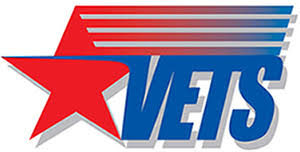
When
- Tuesday, June 11, 2019, beginning at 9:00 a.m. – 4:30 p.m. (EST).
- Members of the public are encouraged to arrive early to allow for security clearance into the USDOL headquarters building known as the Frances Perkins Building. A Driver’s license or other form of identification is required.
Where
- S. Department of Labor, Frances Perkins Building, 200 Constitution Avenue NW, Washington, DC 20210, Conference Room N4437 A B & C.
RSVP
- All meeting participants should submit a notice of intent to attend by Friday, May 31, 2019, via email to Mr. Gregory Green at gregory.b@dol.gov,subject line “June 2019 ACVETEO Meeting.”
Wednesday, May 22, 2019: NLRB Rulemaking Agenda Announced
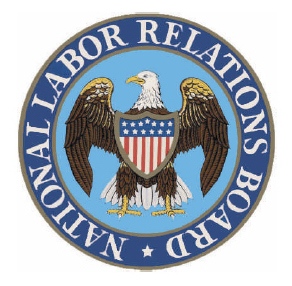
Long-Term Actions include:
- Revision of Representation Case Rules
- Joint-Employer Rulemaking
The NLRB issued its Notice of Proposed Rulemaking (“NPRM”) on September 14, 2018 regarding the standard to determine joint-employer status. The Board extended the public comment period not once, not twice, but three times; which allowed for nearly 29,000 comments. “The Board is pleased with the number of comments we received in response to our proposed joint-employer rulemaking and looks forward to considering each one,” NLRB Chairman Ring stated. “The number of comments reflects the public’s strong interest in the Board providing greater clarity in this important area of the law.”
Side Note: The Department of Labor announced its NPRM for joint employer regulation in April 2019. This item also appears on the Wage and Hour Spring Regulatory agenda, see additional story below.
Short-Term Actions the NLRB also announced include:
- Reviewing the Board’s current standards to block charges, voluntary recognition, and the formation of Section 9(a) bargaining relationships in the construction industry.
- Reviewing the standard to determine whether students who perform services at private colleges or universities in connection with their studies are “employees” within the meaning of Section 2(3) of the National Labor Relations Act (29 U.S.C. Sec. 153(3)).
- Reviewing the standards for access to an employer’s private property.
Friday, May 24, 2019: Spring Regulatory Agenda Released
The Trump Administration’s Unified Agenda of Regulatory and Deregulatory Actions reports on the actions administrative agencies’ plan to issue in the near and long term.
From the Office of Federal Contract Compliance Programs, items to address include:
- Affirmative Action and Nondiscrimination Obligations of Federal Contractors and Subcontractors: TRICARE and Certain Other Healthcare Providers (1250-AA08)
- Implementing Legal Requirements Regarding the Equal Opportunity Clause’s Religious Exemption (1250-AA09)
- Nondiscrimination Obligations of Federal Contractors and Subcontractors: Procedures to Resolve Potential Employment Discrimination (1250-AA10)
From the Wage and Hour Division, items to address include:
- Request for Information: The Family and Medical Leave Act of 1993
- Defining and Delimiting the Exemptions for Executive, Administrative, Professional, Outside Sales and Computer Employees 1235-AA20
- Tip Regulations Under the Fair Labor Standards Act (FLSA)(1235-AA21)
- Regular and Basic Rates Under the Fair Labor Standards Act (1235-AA24)
- Joint Employer Status Under the Fair Labor Standards Act (1235-AA26)
- Expanding Employment, Training, and Apprenticeship Opportunities for 16- and 17-Year-Olds in Health Care Occupations under the Fair Labor Standards Act (1235-AA22)
- Authorizing Electronic Payments of Civil Monetary Penalties (1235-AA28)
From the Equal Employment Opportunity Commission (“EEOC”), highlights of the items to address include:
- Amendments to regulations under the Americans with Disabilities Act (“ADA”) and Amendments to regulations under the Genetic Information Nondiscrimination Act (“GINA”). EEOC staff is developing a Notice of Proposed Rule Making to address wellness programs under the ADA and GINA in response to the court’s most recent ruling. See AARP v. EEOC, 267 F. Supp. 3d 14 (D.D.C. 2017).
- Enforcement of Nondiscrimination on the Basis of Disability in EEOC Programs/Activities and Accessibility of Electronic and Information Technology. The revised rule will update terminology the ADA Amendments Act of 2008 changed, add updated examples of auxiliary aids and services based on the Commission’s own practice and the U.S. Department of Justice’s updated regulations promulgated in 2016 under title II and III of the ADA, and make other technical revisions for clarity.
Now that the Commission has a Quorum, the EEOC could issue the referenced Rules at any time, although it proposed no dates.
Friday, May 24, 2019: OFCCP Declined to Appeal Its Loss in The Analogic Pay Discrimination Case

The case is OFCCP v. Analogic Corp., 2017-OFC-00001 (ALJ March 22, 2019).
Here are the notable conclusions of law which you may now cite to OFCCP in audits:
- In a Teamsters case (OFCCP’s most popular legal theory to date in failure-to-hire and failure-to-compensate case prosecutions and in OFCCP audits), the contractor (“Kor”) may attempt to rebut OFCCPs statistics as “flawed” but “…may also attempt to rebut the prima facie case by establishing a legitimate, non-discriminatory reason for the observed disparity.”
- The Kor’s “…evidence of a nondiscriminatory reason, must make a ‘clear and reasonably specific showing’ through admissible evidence that the disparity is explained by a nondiscriminatory reason.”
- Practice Tip: Put forward in OFCCP audits all of your Disposition Codes (in failure to hire cases) or your legitimate non-discriminatory explanations of pay disparities in pay cases. OFCCP must first put forward a compelling challenge defeating and proving not applicable all the usual reasons employers like your company reject Applicants or fail to pay employees more than claimed due, and then must prove “false” any legitimate non-discriminatory explanations you do put forward.
- In a Griggs “Disparate Impact” case, “OFCCP must do more than demonstrate a statistical disparity to prove a disparate impact violation. OFCCP must also identify a facially neutral employment policy or practice used by Analogic that causes the disparity in female assembler hourly wage” [sic].
- Held: “…OFCCP has not identified the employment practice which caused the asserted wage disparity and has failed to establish a case of disparate impact.”
- Practice Tip: In audits, demand that OFCCP identify to you the “neutral” employment policy or practice OFCCP is claiming causes any “adverse impact” OFCCP is alleging exists.
- In Griggs “Disparate Impact” cases, OFCCP must also identify the “particular” employment policy or practice which is causing the claimed statistical disparity (this is the so-called “particularity” requirement) and forbids OFCCP from combining different factors which affected pay in its statistical analyses (a discredited “bouillabaisse” analysis). In the Analogic case, OFCCP utterly failed to put forward any evidence that it could not separately analyze Analogic’s pay steps (as opposed to analyzing, as it did, all of Analogic’s pay data decisions in one statistical batch despite six different and discrete factors which affected pay).
- Practice Tip: In audits, demand that OFCCP statistically analyze EACH factor which affects pay if the agency is alleging that your pay “adversely impacts” one or more Protected Groups. Do not allow OFCCP to “bundle” several different factors which affect pay into a “bouillabaisse” analysis and describe the result as evidence of “adverse impact.” (This is a forbidden “quota” analysis).
- “…Courts have held regression analyses which do not include the major factors used by employers are not probative.”
- “…Courts have determined regressions which do not include major factors cannot support a finding of discrimination.”
- Note: It is OFCCP’s burden to identify and quantify all the “major” factors which affect pay. If the data are not digitized for computer analysis (to allow for a regression analysis), OFCCP must either undertake the costs to digitize them, or must abandon its investigation of systemic pay discrimination.
- What does this mean to contractors? STOP paying for pay equity studies which cannot or do not analyze ALL the major factors which affect pay.
- Practice Tip: Probably 98% or more of OFCCPs current pay audits should stop (or convert to selected discrete “cohort” (“Harry vs. Sally”) analyses in the opening minutes of any pay audit…ONCE the contractor advises OFCCP that all of the “major factors” which affect pay are NOT digitized. Affirmatively provide OFCCP that information BEFORE you spend dozens or hundreds of hours gathering pay data to respond to OFCCP in an analysis it cannot properly and professionally complete. Do not wait for OFCCP to ask. Offer that information in response to OFCCP’s audit Scheduling Letter and Itemized Listing document and information request.
- “… to successfully make a case of disparate treatment, OFCCP must also produce anecdotal evidence of intentional discrimination against female assemblers.”
- Held: Having considered OFCCPs vague and generalized opinion “evidence” that several Analogic male managers were “chauvinistic” was “weak and unpersuasive.”
Tuesday, May 28, 2019: EEOC Component 2 Updates!

- June 3, 2019: update its website for Survey filers to include contact information for Helpdesk services;
- June 17, 2019: rollout a “fully staffed Helpdesk” to answer e-mail and telephone call questions from filers;
- July 15, 2019: open the 2017/2018 EEO-1 Survey Component 2 reporting portal.
THIS COLUMN IS MEANT TO ASSIST IN A GENERAL UNDERSTANDING OF THE CURRENT LAW AND PRACTICE RELATING TO OFCCP. IT IS NOT TO BE REGARDED AS LEGAL ADVICE. COMPANIES OR INDIVIDUALS WITH PARTICULAR QUESTIONS SHOULD SEEK ADVICE OF COUNSEL.
SUBSCRIBE.
Compliance Alerts
Compliance Tips
Week In Review (WIR)
Subscribe to receive alerts, news and updates on all things related to OFCCP compliance as it applies to federal contractors.
OFCCP Compliance Text Alerts
Get OFCCP compliance alerts on your cell phone. Text the word compliance to 55678 and confirm your subscription. Provider message and data rates may apply.

